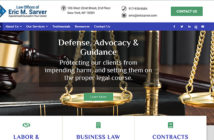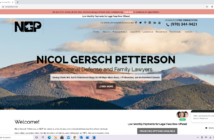How 2 lawyers use their books to attract and land new clients, with their assessment of results.
Writing and publishing a book brings a lot of prestige. As employment lawyer Jon Hyman says, it adds instant credibility to you as a lawyer — no matter what your practice area is.
Many self-published or independent authors are proud that they published their own books, and many of them have become quite successful. Traditional publishing, however, is not dead. Both attorneys who participated in this case study published their books through traditional publishing companies. Nevertheless, attorney Greg Guedel, a specialist in Native American law, recommends doing it yourself if you think you have something important to say and can’t find a traditional publisher to take your book.
Both Jon Hyman and Greg Guedel have important advice for would-be attorney-authors about writing, publishing, and promoting your book.
Here are their bios:
Jon Hyman is a partner in the Labor & Employment group of Kohrman Jackson & Krantz in Cleveland, Ohio. He is the author of the Ohio Employer’s Law Blog, the hub of his online platform, and “The Employer Bill of Rights” from Apress and “Think Before You Click” from Thompson Information Services.
W. Greg Guedel is the author of the Native American Legal Update Blog and “Strategies and Methods for Tribal Economic Development.” He is a member of the Foster Pepper PLLC law firm in Seattle, Washington. He specializes in Native American legal issues, construction and real estate litigation, and employment and labor relations.
1. Has your book, or books, resulted in you generating new leads for your law practice?
Jon Hyman: Yes, I’ve done that.
Greg Guedel: Yes, that’s definitely a part of the big picture.
2. If yes, can you trace those leads directly to your book or do your clients come to you through a variety of means that include your books?
Jon Hyman: A variety of means. The book publishing opportunity came through my various social networking activities — blog, Twitter, Facebook, LinkedIn, and Google+. The blog is the core of it all.
It’s hard to say where it all comes from, but the books came from the blog and the business leads come from the books, the blog, and other things too. I lump it all in together. I do speaking engagements.
Greg Guedel: Certainly from a variety of means, but a number of contacts come directly as a result of the book. We organized a marketing campaign around the book. We sent out a notice and spread the word spread to our community.
Any number of times, I might get a call or e-mail from someone who read the book or a call from someone who was referred to me by someone who read the book.
The key to success for me was building a marketing campaign around the book.
3. Is your book self-published or did you go through a traditional publishing company?
Jon Hyman: I went the traditional route on both books.
Greg Guedel: Traditional. I was asked to write the book by Thomson Reuters Westlaw.
4. To what extent is your blog responsible for generating sales for your book and new client generation?
Jon Hyman: I call it hub-and-spoke marketing. The blog is the hub and everything feeds off of there and then goes back to the blog. I write a blog post and the posts go out to Twitter, Facebook, LinkedIn, etc. I also cross-post to other blogs and that feeds back into the blog, as well. I’m a regular feature writer at Workforce.com and that sends additional traffic back to the blog.
Greg Guedel: It’s definitely a fundamental part of our approach. When the book came out, we linked to it from the blog. You’ll see a copy of the book cover on the right side of the blog and if you click on that, it will take you to the Amazon page where the book is available. We use the blog to promote the book, and the book promotes the blog.
We connect articles on the blog to Twitter with several thousand followers. We get a lot of information out a few times a month. Contacts come through Twitter and the blog promotion efforts.
The other thing we do is podcasting. We have an iTunes page, and when we do a seminar at the firm we will videotape and audio record that seminar and promote the podcast on the blog. You can go on iTunes and find the Foster Pepper PLLC section to listen to the podcast. It’s free.
Several times a year we will videotape a seminar at the firm and people can watch the video on the Foster Pepper PLLC website. Then I promote it through my blog. We always have a live audience in the room, but we also do a live webcast and people can tune in to the seminar in real time. They can type a question or comment into their computer and the speaker can answer their questions in real time.
We also have an electronic mailing list for people who have an interest in the matter. I’ll send out an announcement to the list, and there is a link for people to click so they can listen to the podcast or watch the video.
We try to hit every way we can think of to reach people who are interested. We send out information through every channel.
5. How long have you been blogging?
Jon Hyman: The blog will be seven years old this May [2014].
Greg Guedel: I think we started around 2006, so about seven or eight years now.
6. What other methods do you employ in conjunction with marketing your book that lead to new clients for your law practice?
Jon Hyman: Social media. And I do a lot of speaking engagements all over the country, webinars, and in-person seminars.
Greg Guedel: I speak regularly at seminars and other programs that are held all over the country. These are generally of interest to people who might be interested in Native American legal issues.
7. How would a lawyer go about getting a book published if they wanted to increase their exposure to new potential clientele?
Jon Hyman: It’s hard for me to say to other attorneys that you should write a book because I didn’t pursue that for myself. It just fell into my lap. All I can say is what worked for me. I got my first book deal 4-1/2 years after I started writing the blog.
In both cases, the publisher came to me because I had built up a presence online. They came to me because they were looking for someone to write about that topic. I had built up a following on my blog, and they had a sense for how I wrote.
I will say this: Don’t write a book because you think it’s going to be a marketing magic pill. Write it because you have something to say and you enjoy doing it. Anything that comes out of it is really gravy to me.
Greg Guedel: For me, the substance of the book came from things I had been working on and talking about for some time. I would take, for example, lectures from seminars, and I realized I had quite a bit of material. Start with knowing what you want to write about, and have a fair amount of substance that you can write about before you get into it.
Depending on the subject area, there are a number of publishers who might specialize in a particular topic. I would search for a publisher who specializes in family law, or employment law, whatever your specialty is. What they are looking for initially is a one to two page outline, a detailed chapter by chapter outline.
8. Do you do most of your book promotion online or off line, and what seems to work best for you?
Jon Hyman: Most of it is online. I always promote my books when I speak.
The bulk of the promotion has been on my blog, Twitter, and through other social media. This morning, my blog post was a flat out shill because Suzanne Lucas wrote a review on her blog. More often than not, it’s a soft sell.
Writing books is not my business. I’m an attorney. I’m not going to retire because I write books. I’m going to retire from my legal practice. To me, it cheapens my legal practice if I spend my time promoting my books. So I make them available, but I’m not actively promoting them in an attempt to sell as many copies as I can.
Greg Guedel: You can reach so many more people online. Partly because my subject matter can theoretically be of interest to anyone in the U.S. or Canada, it’s easier to promote online. I don’t have a budget to travel to all the states and to get my book in Barnes & Noble and do book signings. Having the ability to reach people electronically is more cost effective.
9. Are you selling more print copies or e-books? Which format brings you more clients?
Jon Hyman: It’s hard to tell. I sell a fair amount of both, but it’s not my primary source of income. The social media book is e-book only. It’s available only through the publisher. “The Employer Bill of Rights” is available in both print and e-book, and is available at Amazon, Barnes & Noble, Apress, and Apple’s iBook store.
Greg Guedel: My book is in print only. It’s only been published a few months. The publisher might have plans to publish it electronically, but it’s not out in e-book yet.
10. How long after publishing a book should an attorney expect new business from his authorship status?
Jon Hyman: It’s hard to say. To me, it’s all one integrated marketing strategy. It’s an ongoing, organic thing.
Greg Guedel: I think pretty quickly if you set up your marketing campaign in advance. It was about two months before the publishing date, for me. That’s when we started seriously strategizing about how we were going to market the book. We put together a well-organized campaign around the book launch. You can start getting calls right away.
11. Would you recommend self-publishing or traditional publishing?
Jon Hyman: I went traditional both times. I had people to work with who knew what they were doing. I had copyeditors, formatters, and marketers to promote it. The process was seamless. If you can go traditional, it’s great because all you have to do is write the book. I got an advance for the second book. That was nice.
Greg Guedel: I think if you have the opportunity, go traditional. Traditional publishers have the means of getting a book out far and wide. But if you can’t find anyone to do it, then I would recommend self-publishing. Why not? Sometimes, publishers might not be in tune with what people in a particular niche want. So if you have the means and you can’t find a publisher, then you can go the self-publishing route.
12. What other suggestions do you have for lawyers regarding attracting new clients or generating leads from publishing a book?
Jon Hyman. For me, it’s the ability to market myself as an expert in my field. It adds credibility, and credibility is everything. When people hire a lawyer, they want to know a person is credible, and a book gives instant credibility.
In terms of attracting new business, I don’t think people should publish out of a notion that clients are going to start flooding in the door. Books are niche products in the legal industry. You’re never going to sell a ton of books because you’re selling to a narrow audience. You should write because you enjoy it. If you enjoy it, the product will be good and it will come out naturally on the page.
Greg Guedel: I think it needs to be a part of an overall strategic marketing plan. Writing a book and hoping someone will read it and call you isn’t enough. You have to look at it as any other piece of your practice that you want people to know about and build a complete campaign. What you want to think about in advance is your target audience, how you can get your information to them, and how you can leverage your network.
Contact the American Bar Association and see how they can help you get your book published or promoted through their committees. Send information to their members. Contact niche legal associations related to your area of practice and let them know about your book. That’s free advertising. Come up with a strategy to let people know about it. That’s the only way they will find out.
Parting Advice
Jon Hyman. Write because you enjoy it. Don’t write to sell books. You’ll have a better product if you write because you want to write, and your product will be a better product.
Greg Guedel: Develop a targeted marketing campaign before your actual book launch. Send notices to niche associations or groups that specialize in your legal practice area or the subject of your book before publication date, see if you can get speaking engagements, and start the marketing before the book is published.



